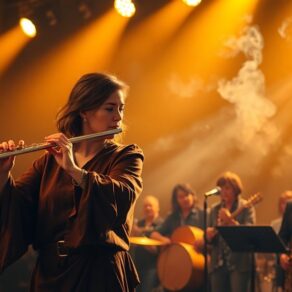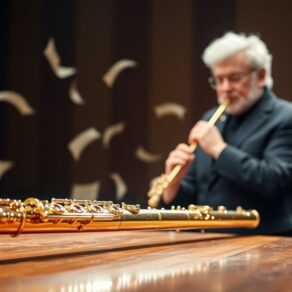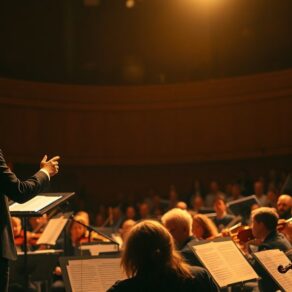Emmanuel Pahud's precision revolutionizes flute performance, blending technical mastery with profound emotional expression. You'll notice his unique sound resonates with warmth, creating an intimate connection with audiences. By embracing contemporary techniques, he pushes traditional boundaries, making room for innovations like multiphonics and body percussion. His collaborations with modern composers expand the flute repertoire, encouraging fresh interpretations and diversity. Pahud's teaching philosophy nurtures individual creativity, building confidence in future generations of flutists. Ultimately, his impact shapes both the present and future landscape of flute music. Explore further to uncover the depths of his contributions and legacy.
Key Takeaways
- Emmanuel Pahud's unique sound blends technical proficiency with emotional depth, setting a new standard for modern flute performance.
- He embraces extended techniques, expanding the tonal palette of the flute and inviting exploration of innovative sound worlds.
- Pahud revitalizes the flute repertoire by collaborating with contemporary composers and showcasing lesser-known compositions.
- His teaching philosophy emphasizes individual expression and creativity, inspiring future generations of flutists to blend tradition with innovation.
- Pahud's commitment to accessibility in music education promotes a supportive environment for aspiring musicians, enhancing their artistic development.
Early Life and Musical Training
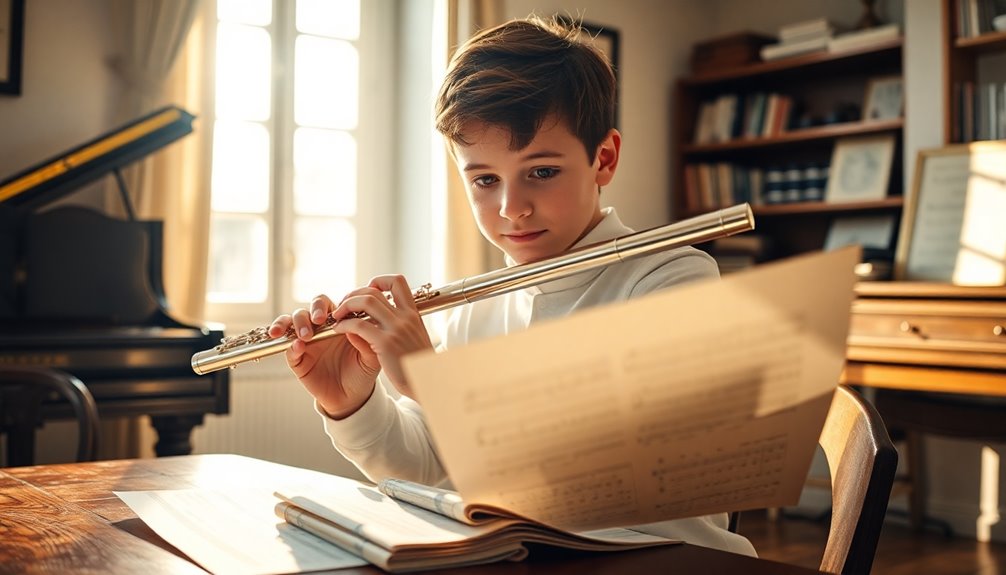
Emmanuel Pahud's early life and musical training laid a solid foundation for his extraordinary career as a flutist. Growing up in a musical family, you can see how his childhood influences shaped his artistic journey. Surrounded by melodies and instruments, he developed an innate appreciation for music that many aspiring musicians wish they had. This nurturing environment allowed him to explore various musical styles, fostering a deep connection to the art form.
From an early age, Pahud's exposure to diverse genres and techniques sparked a passion for the flute. His parents, both musicians, recognized his talent and encouraged him to pursue formal training. By immersing himself in lessons and performances, he honed his technical skills and cultivated a unique voice on the instrument. You can appreciate how critical these early experiences were in shaping his approach to music.
Additionally, Pahud's childhood interactions with other musicians enriched his understanding of collaboration and expression. As he participated in chamber music and orchestral settings, he learned the importance of listening and responding to fellow musicians. This sense of community is something many musicians yearn for, and it certainly influenced his later work. His early experiences with beginner-friendly features helped him understand the significance of accessibility in music education.
Signature Performance Style
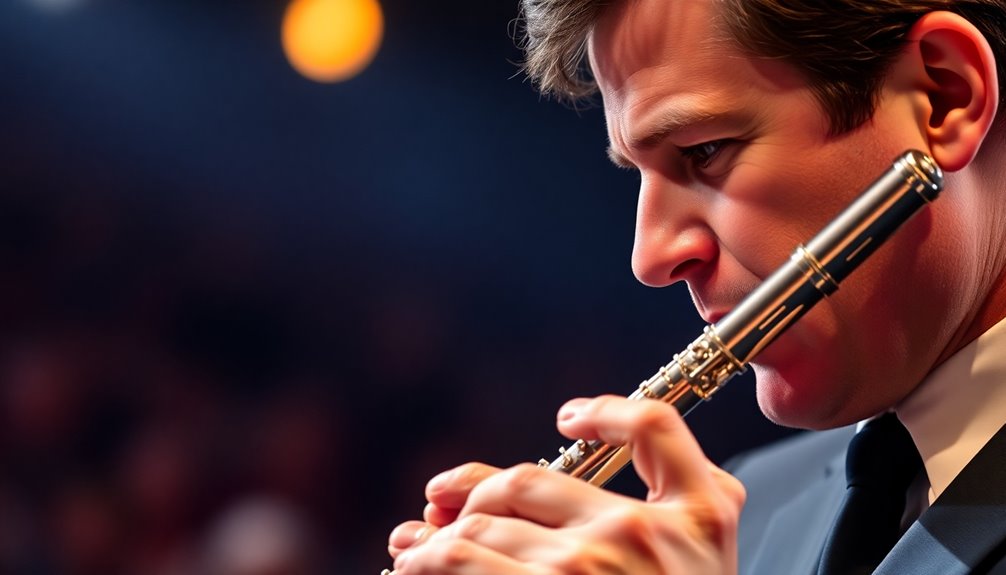
Pahud's signature performance style is characterized by a remarkable blend of technical proficiency and emotional depth. When you listen to him play, you can't help but notice his unique ability to convey profound feelings through every note. His signature sound, rich and resonant, captivates audiences and creates a deep connection that transcends mere technical execution.
One of the hallmarks of Pahud's artistry is his expressive phrasing. He effortlessly shapes melodies, allowing each phrase to breathe, which adds a layer of storytelling to his performances. This attention to detail is what sets him apart in the world of flute music.
Here's a quick comparison of some key elements of Pahud's style:
| Element | Description |
|---|---|
| Technical Proficiency | Mastery over complex fingerings and techniques |
| Emotional Depth | Ability to evoke feelings through dynamics and tone |
| Signature Sound | A warm, rounded tone that resonates deeply |
| Expressive Phrasing | Artful shaping of melodies with intentional pauses |
| Audience Engagement | Creates a sense of intimacy and connection with listeners |
As you explore his work, you'll find that Pahud's performances are more than just technical displays; they're emotional journeys. His commitment to bringing out the beauty in each piece invites you to experience the music fully, making you feel like a part of something greater. This is why his signature performance style continues to inspire both audiences and flutists alike. Additionally, his ability to execute techniques such as vibrato techniques showcases his dedication to enhancing emotional expression through refined musicality.
Contributions to Flute Repertoire
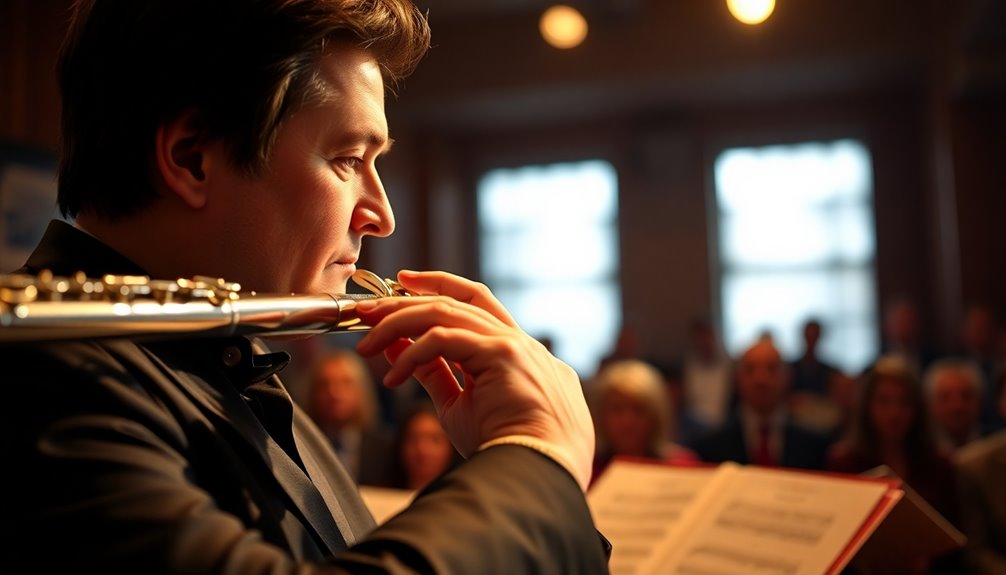
How has Emmanuel Pahud reshaped the flute repertoire? His contributions have been profound, pushing the boundaries of what flute compositions can achieve. Pahud's collaborations with contemporary composers have led to a repertoire expansion that reflects modern sensibilities and technical demands. By commissioning new works, he invites flutists to investigate innovative sounds and techniques that were once considered outside the norm.
Pahud doesn't just play existing pieces; he revitalizes them. His interpretations of classical works breathe new life into compositions, encouraging musicians to reconsider how they approach traditional repertoire. This approach not only enriches the performance landscape but also fosters a sense of community among flutists, as they share and discuss these revitalized interpretations.
Moreover, Pahud's dedication to showcasing lesser-known works brings attention to hidden gems within the flute repertoire. By performing and recording these pieces, he cultivates a broader appreciation for diverse styles and voices in flute music. This expansion creates opportunities for flutists to connect with a wider range of compositions, enhancing their artistry and expression. Furthermore, his performances often incorporate experimental techniques that challenge both the player and the audience, showcasing the flute's versatility and expressive capabilities.
In essence, Emmanuel Pahud's impact goes beyond mere performance; he's reshaping the very fabric of flute repertoire. His efforts encourage flutists to engage with both old and new compositions, fostering an environment of growth and exploration.
As you investigate this evolving repertoire, you'll find a sense of belonging within the vibrant community that Pahud has helped create.
Influence on Contemporary Composers
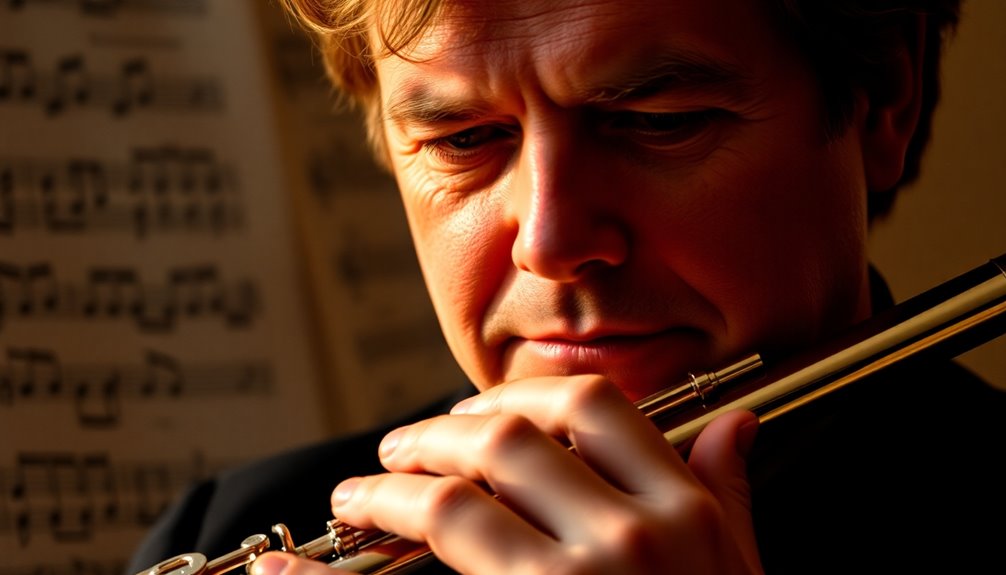
The impact of Emmanuel Pahud on the flute repertoire naturally extends to contemporary composers, who find inspiration in his innovative approach. When you consider the evolution of flute music, it's clear that Pahud's artistry encourages composers to explore uncharted territories. His willingness to commission new works challenges them to push boundaries and embrace contemporary techniques that might've once seemed unconventional.
Through Pahud's collaborations, you see a dynamic shift in the flute's role within modern orchestration. He doesn't just play the notes; he embodies a creative spirit that resonates with composers enthusiastic to experiment. They're inspired by his ability to meld classical phrasing with avant-garde elements, enabling a fresh dialogue between tradition and innovation.
This collaboration often leads to pieces that aren't just for the flute, but rather works that redefine how flutists interact with the broader musical landscape. Moreover, his commissions have given rise to a wealth of new repertoire, encouraging composers to incorporate extended techniques, multiphonics, and other contemporary sounds that elevate the flute's expressive capabilities. This creative atmosphere nurtured by Pahud aligns closely with the shared passion for music that fosters a supportive and inspiring environment for all involved.
As you engage with these new compositions, you'll find that Pahud's influence fosters a community of creativity and experimentation. It's about more than just performance; it's a movement that invites both musicians and audiences to embrace the future of flute music. In this way, Pahud's legacy continues to shape the soundscape of contemporary composition, fostering a sense of belonging for flutists and composers alike.
Innovations in Flute Technique
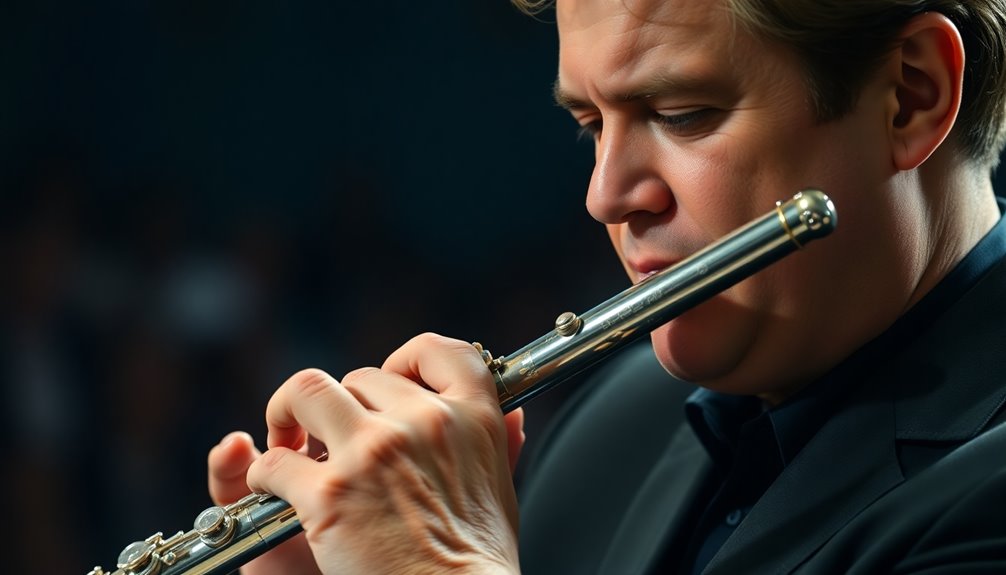
Innovations in flute technique have greatly transformed the instrument's capabilities, largely due to Emmanuel Pahud's groundbreaking approach. When you investigate Pahud's performances, you'll quickly notice how he pushes the boundaries of traditional flute playing. His embrace of extended techniques—like multiphonics, flutter-tonguing, and harmonics—invites you to explore new sound worlds. These methods not only expand the flute's tonal palette but also challenge you to rethink what's possible within your own playing.
Breath control becomes a central focus in mastering these techniques. Pahud demonstrates that the ability to manage your airflow is key to executing these extended techniques effectively. When you practice breath control, you're not just improving your endurance; you're enhancing your expressive capabilities. You'll find that precise breath management allows for greater dynamic range and articulation, driving your performance to new heights. Additionally, mastering breath support is essential for maintaining consistent tone and ensuring that the complexities of advanced techniques are executed with clarity.
Moreover, Pahud's innovative use of the flute as a percussive instrument opens up fresh avenues for creativity. By incorporating body percussion and rhythmic patterns, he encourages you to think outside the box and engage listeners in unexpected ways. This not only enriches your musical expression but also fosters a deeper connection with your audience.
Ultimately, by embracing these innovations, you'll not only elevate your own playing but also contribute to a broader evolution of the flute as a versatile instrument. Pahud's influence reminds you that the journey of exploration in flute technique is ongoing, inviting you to continuously discover and redefine your musical identity.
Teaching Philosophy and Mentorship
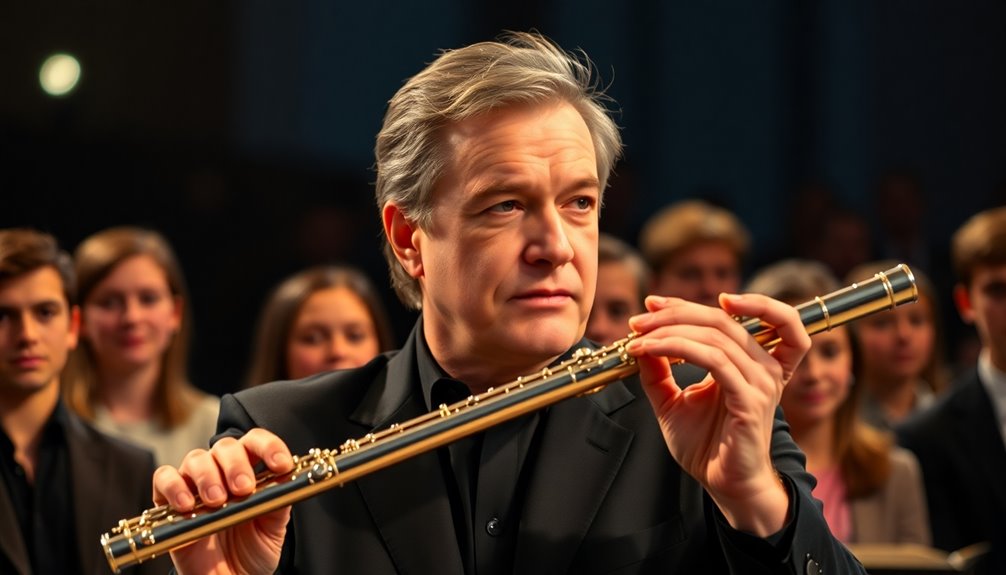
Emmanuel Pahud's commitment to pushing the boundaries of flute performance extends into his teaching philosophy and mentorship. His mentorship approach is rooted in fostering a supportive environment where students feel empowered to explore their unique artistic voices. Pahud emphasizes the importance of individual expression, encouraging you to embrace your creativity while grounding your technique in solid fundamentals.
His teaching methodology integrates both traditional and contemporary techniques, reflecting his belief that adaptability is key to success. By combining rigorous practice with innovative exercises, he challenges you to think critically about your playing. This dual emphasis not only nurtures technical proficiency but also cultivates a deeper understanding of musical interpretation.
Pahud's mentorship goes beyond mere instruction; it's about building a community. He actively engages with students, providing constructive feedback that encourages growth and resilience. You'll find that his approach emphasizes collaboration, fostering an atmosphere where ideas can flourish.
This sense of belonging is crucial, as it allows you to connect with peers and mentors alike, creating a network of support that extends beyond the studio. Additionally, he encourages students to understand the importance of flute maintenance for ensuring instrument longevity and sound quality.
In essence, Pahud's teaching philosophy and mentorship reflect his dedication to elevating the next generation of flutists. His focus on individual artistry and community engagement not only shapes skilled musicians but also instills a lasting passion for the flute. Through his guidance, you can develop both technically and artistically, ensuring that your journey as a flutist is as enriching as it's transformative.
Legacy and Future Impact

While many musicians leave a mark through their performances, Pahud's legacy is cemented in the transformative influence he's on both the art of flute playing and the flutists who follow him. His musical legacy extends beyond his technical prowess; it encompasses his ability to inspire and educate. By setting a high standard, Pahud not only elevates the expectations for flutists but also cultivates a sense of belonging within the flute community.
As you explore his recordings and performances, you'll notice how he redefines the nuances of expression and interpretation. His mastery encourages future generations to embrace both tradition and innovation. Pahud's dedication to expanding the flute repertoire, commissioning new works, and collaborating with composers pushes boundaries, inviting flutists to venture into uncharted territories.
Moreover, his teaching philosophy emphasizes the importance of personal artistry. This focus helps you realize that technical excellence must be complemented by emotional depth. Pahud nurtures the next wave of flutists by instilling in them the confidence to find their unique voices, guaranteeing the continuity of his impact on the instrument. Additionally, his work highlights the emotional and cultural significance of flute melodies, reinforcing the instrument's deep connections to diverse traditions.
In essence, Pahud's influence is multifaceted. As you engage with his legacy, you're not just witnessing a musician's journey; you're becoming part of a larger narrative that values innovation, community, and emotional connection. This guarantees that his impact will resonate through the ages, shaping the future of flute performance for generations to come.
Frequently Asked Questions
What Specific Flutes Does Emmanuel Pahud Prefer to Play?
When exploring what specific flutes Emmanuel Pahud prefers, you'll find he often plays a Brannen or a Haynes.
These brands are known for their exceptional craftsmanship and tonal quality.
Pahud's flute choices reflect his desire for precision and versatility, allowing him to express his musicality fully.
How Does Pahud Prepare for a Performance?
Imagine stepping onto a stage, nerves humming like a tightly strung bow.
To prepare for a performance, you establish a meticulous performance routine that calms the storm within. You engage in mental preparation, visualizing each note and movement as if painting a masterpiece.
Practicing scales and pieces with intention, you build confidence, allowing the music to flow through you. This dedication transforms anxiety into artistry, creating a bond with both the audience and the music.
What Are Pahud's Favorite Pieces to Perform?
When exploring Pahud's repertoire, you'll find that his performance favorites often include pieces that showcase emotional depth and technical brilliance.
He frequently performs works by composers like Mozart and Debussy, as they allow him to express his artistry fully.
You'll notice his passion for contemporary pieces, too, as they challenge both him and the audience.
This blend of classics and modern works reflects his commitment to pushing the boundaries of flute performance and connecting with listeners.
Has Pahud Collaborated With Other Musicians?
Yes, Pahud's collaborated with numerous musicians, showcasing a variety of collaborative projects that highlight his versatility.
These partnerships reflect his deep musical influences, blending different styles and genres. You can see how these collaborations enrich his performances, making them more dynamic and engaging.
What Awards Has Emmanuel Pahud Received Throughout His Career?
Emmanuel Pahud's career is marked by numerous prestigious awards, highlighting his exceptional talent and dedication.
These accolades not only signify his mastery of the flute but also amplify his recognition impact in the classical music world.
Each award you see reflects the respect he's garnered among peers and mentors alike, making you feel connected to a larger community that values artistry and excellence.
Pahud's achievements inspire aspiring musicians to aim for greatness.
Conclusion
Emmanuel Pahud's journey through the world of flute performance is like a vibrant tapestry, woven with threads of innovation, artistry, and mentorship. His signature sound dances through the concert halls, inspiring both seasoned musicians and budding flutists alike. As he continues to push boundaries and shape the repertoire, you can almost hear the whispers of future compositions waiting to be revealed. Pahud's legacy not only enriches our ears but also ignites the flames of creativity in generations to come.

